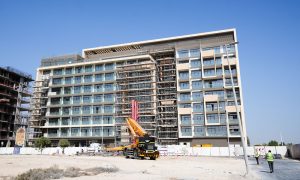Oman faces labour challenge
Industry professionals worry that locals will be attracted to better paying jobs in public sector

RELATED ARTICLES: Oman tourism to boost real estate sector | KSA, UAE lead GCC construction market | Oman expects increased private-public investment
The private sector of Oman’s burgeoning construction industry could face a significant labour challenge if the nationalisation of its workforce is pushed through, industry insiders have said.
With an estimated $20 billion to be invested in transport infrastructure, Oman’s construction market is on an upswing. A number of residential and hospitality focused projects are also currently underway in the Sultanate.
“The construction and projects market in Oman is in good health,” said a report by Dentons & Co, Oman, a law firm that has published an overview of Construction and Projects in Oman.
“Bearing in mind Oman’s relatively small population of only 2.8 million people, the scale of the construction and infrastructure development projects that have already been committed or are under construction is impressive,” said David Courtney-Hatcher, one of the authors of the report.
“The public sector is by far the largest procurer of construction services in the Sultanate of Oman. In the 2011 budget, the government announced Oman’s eighth five-year plan, to run from 2011 to 2015. It envisages a total capital outlay of $79 billion, of which the bulk is to be invested in large construction projects across the country.”
However, construction professionals have expressed concerns about the nationalisation of the Omani workforce and the impact it could have on projects and performance.
“There have been directives that have come out in the press recently, about how the number of expats will need to be reduced in Oman,” said Peter Willmott, project director at Faithful + Gould.
“Really, if you’re increasing construction, then that (number) needs to increase because the Omani population, the national population, isn’t very interested in construction.”
“This place has huge potential, but it’s also balancing between going too far, too fast and making sure that local society adjusts to the new world,” added Marco Malpiedi, managing director of Atkins Oman, during an interview with Big Project ME.
“The construction industry is not so comfortable. Contractors in particular work long hours and the locations aren’t exactly the most salubrious. Trying to attract them (the Omani people) into the industry is a little bit difficult then.
“At the same time, you’ve got expats working here who are working on quite low salaries. So for contractors and consultants like us, to take in someone who’s not necessarily 100% on board with putting in the extra hours and who then sees people in the public sector working fewer hours, earning more and getting pension schemes after 15 years, it’s difficult.”
“It’s very difficult to persuade Omanis to come and work in the private industry, to get lower salaries and take a lot of hassle. But at the same time, the good ones, they appreciate it because they realise that this is somewhere you can actually learn something,” he warned.
However this doesn’t mean that there isn’t the desire to hire Omanis, as Malpeidi is quick to point out. In fact, he insists it’s quite the opposite.
“We want to reflect the country, we want not to just meet the 30% target (set by the Omani government), but make it even as much as 70%. We don’t want to bring in talent from the outside, we want to see what’s here.”
“The problem that we have is that we take in graduates and undergraduates, they work for us for three years and then they go because they want a higher position and we say, ‘no, if you want to build the muscles, it has to be natural, otherwise it won’t happen.’ But that just means that they can get a job elsewhere, or they can start their own company or they can go into the Ministry and get a high position, because they’ve got the Atkins stamp.”

















